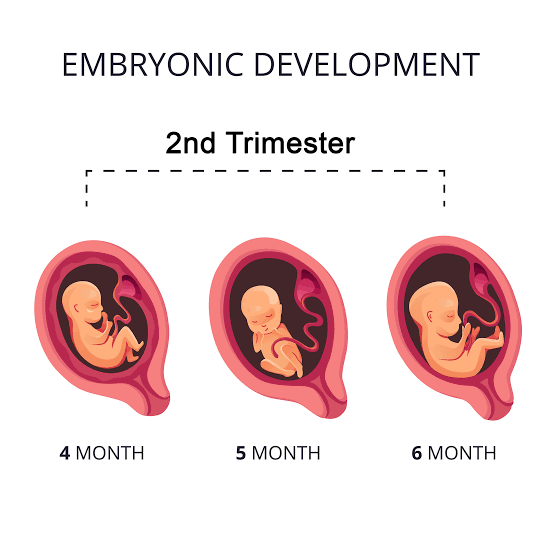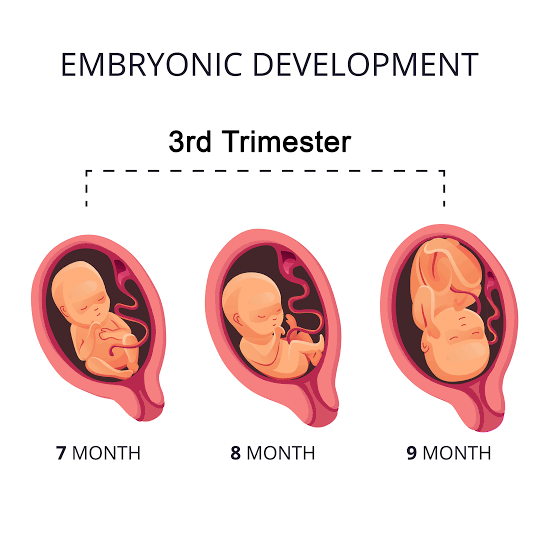First trimester of pregnancy (conception to week 13)
Antenatal care is the medical supervision that every woman should receive during pregnancy. It involves a series of visits to health care professionals for a regular check on you and your baby’s health.
When should you first see the doctor?
You should see a doctor as soon as you know you are pregnant.
What happens at the first visit?
The aim of this visit is to make a care plan for your pregnancy. Your doctor will try to identify any high-risk factors, based on your history, examination, and some routine tests, to determine whether you require any additional care. This will include:
- History
- Physical examination
- Lab tests:
- Blood grouping and Rh type
- Complete blood count
- Fasting/PP blood sugar
- Hepatitis B, HIV, hepatitis C, VDRL (syphilis)
- Hb electrophoresis
- Thyroid function test
- Rubella IgG
- Urine routine and microscopic
- Ultrasound around 7 weeks
Screening of chromosomal abnormalities:
Down’s syndrome is the commonest chromosomal abnormality in live-born babies. It is the result of an extra copy of chromosome no. 21 (trisomy 21). The chances of this abnormality increase with age of the mother. The baby may be born with a variety of birth defects and have impaired social and mental development. A combined test is offered for screening of down syndrome between 11 weeks and 13 weeks which includes ultrasound and a blood test (Double marker). This is a screening test. A diagnostic test will be offered to you, after explaining its risks and advantages, in case a combined test is screen positive, you are 35 years or older, or have had previous baby Down’s syndrome.
Supplements during first trimester
Folic acid: Supplementation with folic acid in the first 3 months of pregnancy, when the baby’s organs are forming, reduces the risk of neural tube defects in the baby. You will be prescribed folic acid 5 mg once a day throughout the first trimester.
Vitamin D: Maintaining adequate levels of vitamin D is important during pregnancy and breastfeeding. A daily intake of 400 IU of vit D is recommended. Alternately, 2000 IU can be taken weekly.
Management of common symptoms of pregnancy
- Nausea, vomiting and heartburn
Also known as morning sickness, but can occur at any time of the day. Presence of absence of this symptom has no correlation with pregnancy outcome. These symptoms usually resolve on its own by 14 to 16 weeks of pregnancy.
Try diet modification:
Avoid carbonated drinks, spicy and oily food
Take small frequent meals
Eat whatever you feel comfortable eating, instead of forcing yourself to try and eat healthy food.
Don’t get up from the bed on an empty stomach in the morning, eat something before you leave your bed in the morning.
If diet modifications do not work, medicines can help to relieve your symptoms, ask your doctor. - Constipation and Hemorrhoids
Modification in diet and lifestyle can help to relieve your symptoms.
Daily exercise and walk.
High fibre foods such as bran, vegetables and fruits.
Increase fluid intake.
Natural fibre supplements like isabgol can be safely taken.
If symptoms remain troublesome, consult your doctor. - Frequent urination
You may have increased frequency of urination during pregnancy. If it is associated with pain or burning, inform your doctor and get urine tested for infection.
Avoid caffeine containing drinks especially in the evening, as they make you urinate more. - Vaginal discharge
Increase in vaginal discharge is usual during pregnancy.
If it is associated with itching, soreness, offensive smell or pain on passing urine, consult your doctor. - Backache
Backache is a common symptom during pregnancy because of relaxation of joints (due to pregnancy hormones) and increased lordosis (increase in spine curvature) with increased weight of baby.
Maintain a good posture. Back should be fully supported while sitting.
Regular exercise and massage therapy can help to ease the symptoms. - Other symptoms
Fatigue: it is not unusual to feel lethargic and have a low energy level during pregnancy. Take short breaks while working to relax.
Mood swings: you might have erratic mood changes during pregnancy. The family must understand that these are transient and be supportive.















